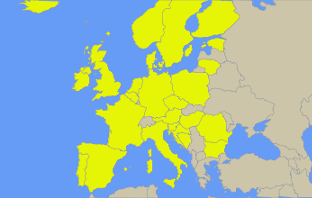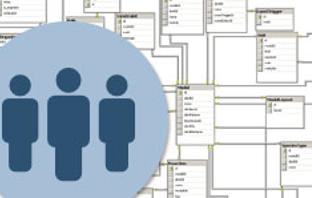Introducing the new COST Action ‘Reassembling the Republic of Letters, 1500-1800: A digital framework for multi-lateral collaboration on Europe’s intellectual history’.

As of September 2014, the 25 countries highlighted have joined the network, with more signing up.
Cultures of Knowledge is delighted to announce the advent of a new scholarly network, funded between 2014 and 2018 by European Cooperation in Science and Technology (COST). This ground-breaking collaboration will bring together scholars, librarians, archivists, media and IT experts to discuss the scholarly, editorial and technical challenges posed by reassembling data on the Republic of Letters in the digital age. From metadata, transcription, and text encoding standards to scholarly debates on intellectual networks and the material letter, the discussion and recommendations arising from these four years will pave the way to the reconstruction of the epistolary heritage of Europe on a scale never contemplated before.
Rationale
The early modern communications revolution allowed scholars to scatter correspondence across Europe, knitting together the international, knowledge-based civil society crucial to that era’s intellectual breakthroughs and formative for many of modern Europe’s values and institutions. The current IT revolution provides means for reassembling and disseminating this precious literary heritage for the first time while fostering new forms of scholarly cooperation. In pursuit of these aims, this COST Action will:
- reconsider historiographically the place of the Republic of Letters in Europe’s cultural formation;
- coordinate the intensive discussion amongst librarians and archivists, IT experts, and scholars needed to plan a state-of-the-art digital system within which to collect a pan-European pool of highly granular data on the Republic of Letters;
- design tools for navigating, analysing and visualising this huge pool of data, and for facilitating new forms of international and interdisciplinary scholarly collaboration, thereby consolidating a new virtual Republic of Letters;
- experiment with using this system to engage the broader public with the cutting-edge technical and scholarly work on this key phase of European cultural and intellectual integration.
How it works
This network is generously funded by COST (European Cooperation in Science and Technology), one of the longest-running European frameworks supporting cooperation among academic researchers across Europe.
 The aim of this COST Action is to allow an international network of leading repositories and research projects to devise a revolutionary piece of scholarly infrastructure for collecting, refining, analysing, and visualising big data on early modern intellectual exchange and to experiment with the potential of that infrastructure both to support traditional scholarship and to transform the communication of that scholarship to broader publics.
The aim of this COST Action is to allow an international network of leading repositories and research projects to devise a revolutionary piece of scholarly infrastructure for collecting, refining, analysing, and visualising big data on early modern intellectual exchange and to experiment with the potential of that infrastructure both to support traditional scholarship and to transform the communication of that scholarship to broader publics.
The Action is chaired by Howard Hotson, Professor of Early Modern Intellectual History and Director of Cultures of Knowledge at the University of Oxford, with vice-chair Dr Thomas Wallnig of the University of Vienna. The Management Committee currently brings together of 60 representatives from 25 European countries, while another 30 will participate as Working Group members. Each bring their own national, disciplinary and institutional expertise and perspective to one of the following six working groups, which are designed to tackle a particular aspect of or approach to the challenge of technical and scholarly collaboration on an ambitious interdisciplinary and international scale:
WG 1: Space and Time.
WG 2: People and Networks.
WG 3: Texts and Topics.
WG 4: Documents and Collections.
WG 5: Data Exchange and Strategic Planning.
WG 6: Synthetic Studies and Outreach.
Further details on all aspects of the project and its upcoming events – including an introductory conference and training school to be hosted at Oxford in March 2015 – will be available later in the year on a new project website. In the meantime, more information can be found on the COST Action homepage, which includes a link to the Action’s ‘Memoradum of Understanding’ which outlines the project in detail.
If you have a relevant digital or scholarly project, you may like to read through the online materials including the Memorandum of Understanding. Expressions of interest in participation in the Action would be warmly welcomed by the Chair and Vice-Chair. This Action is a democratically-organised network, and members are nominated to join the working groups from throughout Europe, so space is necessarily limited. In addition to the Management Committee and the Working Groups, scholars, IT experts, librarians and others will be able to participate as Affiliates in the Action, whether by attending events or contributing to online discussions. Groups outside Europe can also participate as Affiliates.

